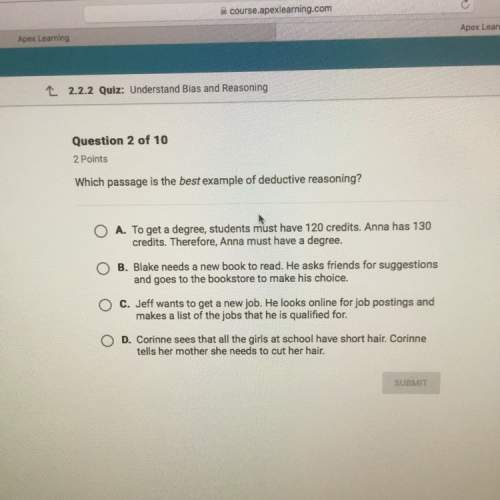
Which literary period's style does the dialogue in the passage below best characterize? "Well, when it come dark I tuck out up de river road, en went 'bout two mile er more to whah dey warn't no houses. I'd made up my mine 'bout what I's agwyne to do. You see, ef I kep' on tryin' to git away afoot, de dogs 'ud track me; ef I stole a skift to cross over, dey'd miss dat skift, you see, en dey'd know 'bout whah I'd lan' on de yuther side, en whah to pick up my track. So I says, a raff is what I's arter; it doan make no track." A. Modernism B. Realism C. Romanticism D. Postmodernism

Answers: 2


Another question on English

English, 22.06.2019 01:00
Read the quotation from "an occurrence at owl creek bridge." and now he became conscious of a new disturbance. striking through the thought of his dear ones was a sound which he could neither ignore nor understand, a sharp, distinct, metallic percussion like the stroke of a blacksmith’s hammer upon the anvil; it had the same ringing quality. he wondered what it was, and whether immeasurably distant or near by—it seemed both. its recurrence was regular, but as slow as the tolling of a death knell. he awaited each stroke with impatience and—he knew not why—apprehension. the intervals of silence grew progressively longer, the delays became maddening. with their greater infrequency the sounds increased in strength and sharpness. they hurt his ear like the thrust of a knife; he feared he would shriek. what he heard was the ticking of his watch. which best describes the effect of the narration in the excerpt? it suggests that the man being executed feels tranquil and at peace. it suggests that the narrator is sympathetic to the man being executed. it suggests that the plot will become less tense as the story continues. it suggests that the story will become more intense and mysterious.
Answers: 1

English, 22.06.2019 03:00
Based on this excerpt the authors are most likely to attempt to answer which question
Answers: 1

English, 22.06.2019 04:00
This passage contains repeated allusions to all the following except. a.sailing b.suitors c.hunting d.dreams
Answers: 1

English, 22.06.2019 06:30
If you want to change from landscape orientation to portrait orientation, what would you do? turn the camera around. flip the camera over. turn the camera 90 degrees. turn the camera 360 degrees.
Answers: 2
You know the right answer?
Which literary period's style does the dialogue in the passage below best characterize? "Well, when...
Questions



Mathematics, 30.05.2020 20:59


Mathematics, 30.05.2020 20:59










Mathematics, 30.05.2020 20:59

Mathematics, 30.05.2020 20:59



Mathematics, 30.05.2020 20:59

Mathematics, 30.05.2020 20:59




